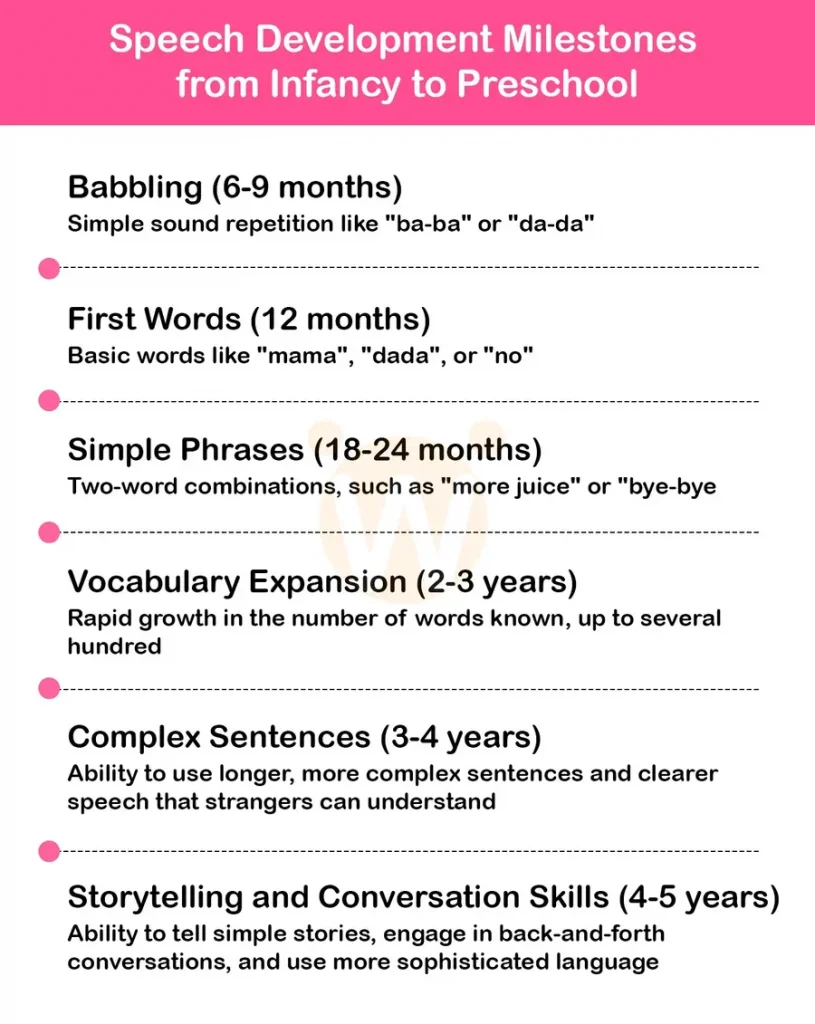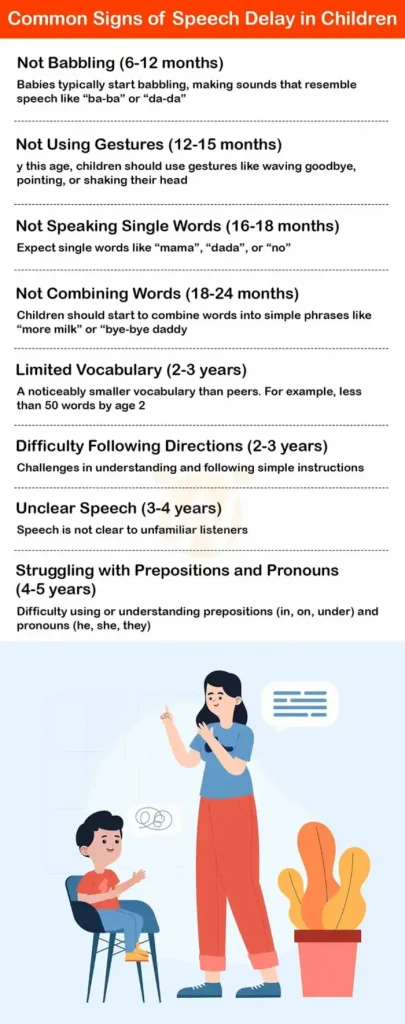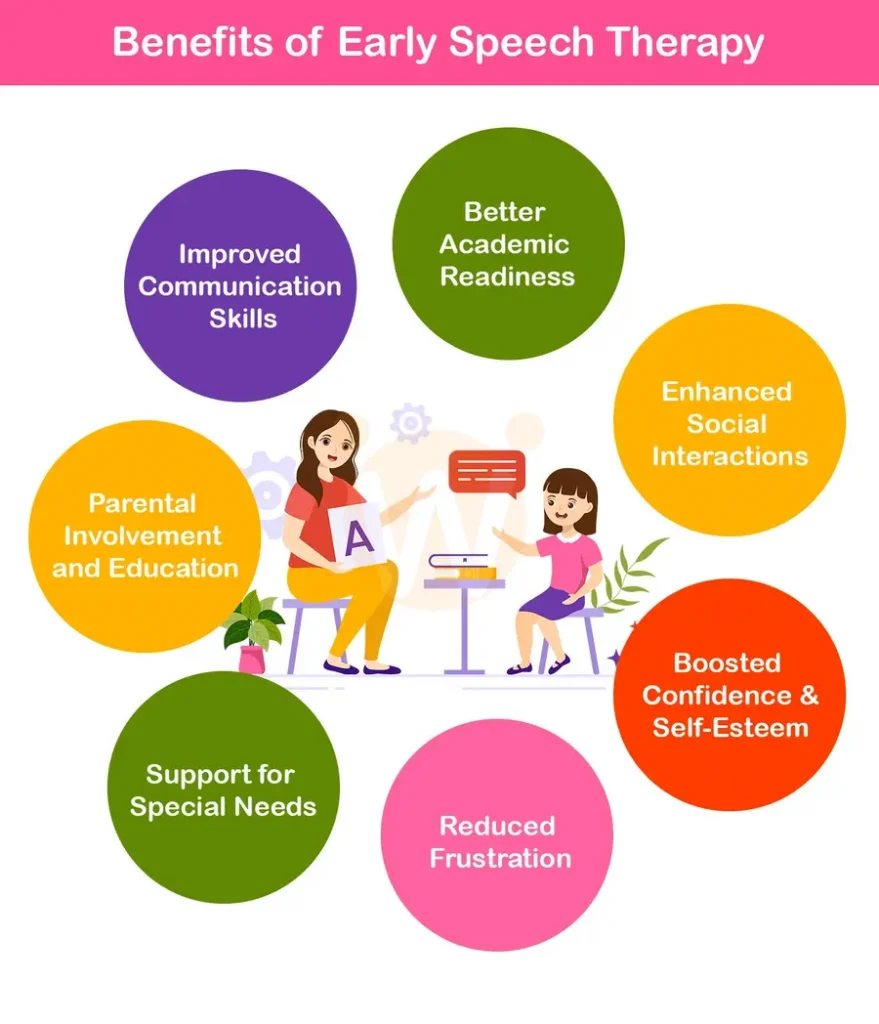12 Speech Delay Myths Every Parent Should Know
By Rajini D
Last Updated: February 8, 2024
As a parent, navigating the journey of your child’s growth and development can be both exhilarating and daunting. Among the various developmental milestones, speech is a significant one that garners much attention and, at times, concern. It’s common for parents to wonder: Is my child speaking as they should? Are they a late talker? Such concerns are often compounded by a flood of well-meaning advice and age-old myths that circulate in our communities.

Understanding speech delays in children is crucial, not just for peace of mind but also for providing the right support if needed. Speech delays can vary widely among children; while some may catch up with their peers without any intervention, others might need a little help along the way. The key lies in distinguishing the facts from the myths – a task that is easier said than done.
This brings us to the importance of debunking these myths. Why? Because myths can not only cause unnecessary worry but can also lead to delayed support for those who really need it. For instance, believing that a child will simply “grow out” of a speech delay could mean missing out on crucial early interventions that could make a world of difference.
For more insights into child growth and development, explore our detailed articles on early identification warning signs in child development.
Understanding Speech Delays in Children
Speech development is a crucial aspect of early childhood growth, acting as a foundation for communication skills vital throughout life. Speech delays in children can be a source of concern for many parents, as they may affect a child’s ability to express thoughts, interact with others, and, in later stages, impact academic performance.

For parents, common concerns often revolve around questions like, “Is my child just a late talker, or should I be worried?” or “What are the early signs of a speech delay?” It’s natural to compare your child’s development to that of their peers or siblings.
However, it’s important to remember that children develop at their own pace. That said, being mindful of the typical milestones can help in early detection. For instance, by the age of 2, most children can use simple phrases, and by 3, their speech is clear enough to be understood by strangers.
The role of early detection cannot be overstated. Identifying a speech delay early on allows for timely intervention, which can significantly improve outcomes. Early intervention can include speech therapy, activities to encourage speech and language development, and, in some cases, addressing underlying medical issues. It’s not about hastening their development but rather providing the right support to facilitate their natural learning process.

Myth #1: Children Naturally Outgrow Speech Delays
One of the most pervasive myths is that children will naturally outgrow speech delays without any need for intervention. This belief, while hopeful, often leads to missed opportunities for early support that could make a significant difference in a child’s communication skills. The truth is, while some children might catch up on their own, many do not. Speech delays can be indicators of underlying issues that require professional attention. For instance, difficulties in speech could be linked to hearing problems, developmental delays, or even social communication disorders.
Early intervention is crucial. If a child’s speech delay is recognized and addressed promptly, it dramatically increases the chances of improvement. Speech-language pathologists can assess a child’s specific needs and tailor interventions accordingly. These could range from structured therapy sessions to simple daily activities that encourage speech and language development.
Learn more about the role of early intervention in speech therapy and its impact.
Myth #2: Baby Talk Hinders Speech Development
Another common misconception is that speaking to children in ‘baby talk’ hinders their language development. Contrary to this belief, baby talk, or more accurately, ‘parentese,’ plays a vital role in language acquisition. This form of speech is characterized by a higher pitch, slower tempo, and exaggerated intonation. It helps in grabbing the child’s attention and making the linguistic structure of speech more noticeable to them.
However, effective baby talk involves more than just a sing-song voice. Here are some tips for engaging in productive baby talk:
- Exaggerate vowel sounds and use a varied tone to highlight the differences in speech sounds.
- Use simple, clear words and short sentences to help your child grasp language basics.
- Pair your words with actions or objects to provide context, making it easier for the child to understand the meaning.
- Engage in a back-and-forth interaction, responding to your child’s babbling and vocalizations, to encourage conversational skills.
Also Read: Speech and Language Milestones: 0 to 12 Months
Myth #3: Boys Inherently Talk Later Than Girls
A common belief among many parents is that boys naturally start talking later than girls. This idea often leads to a relaxed approach towards speech development in boys, assuming it’s just a matter of time. While it’s true that there are slight differences in the development timelines between boys and girls, these are typically minor. Research indicates that boys may start talking a few weeks later than girls, but they usually catch up quite quickly. This small developmental lag in boys does not significantly impact their overall language skills in the long run.
However, this slight difference should not lead to complacency in monitoring a boy’s speech development. Parents should be equally attentive to the speech and language milestones of both boys and girls. Early detection of any speech delay, irrespective of gender, is crucial for timely intervention. If you notice your son is not meeting typical speech milestones, it’s advisable to consult a speech-language pathologist. Early intervention can address any underlying issues and support your child’s language development effectively.
See our article on do boys talk later than girls for more information.
Myth #4: Older Siblings Speaking for Younger Ones Cause Delays
Another myth in the realm of speech development is the belief that younger children develop speech delays because their older siblings speak for them. This assumption suggests that younger siblings don’t get enough practice speaking because their needs and thoughts are often vocalized by their elder brothers or sisters. However, research on birth order and language development does not support this claim.
Studies show that all children in a family generally reach speech and language milestones at a similar rate. In fact, having an older sibling might sometimes be beneficial, as younger children get to observe and engage in more complex language interactions from an early age. While it’s important for younger children to have ample opportunity to speak and express themselves, the influence of elder siblings speaking on their behalf is not typically detrimental to their language development.
Further, explore sibling interactions in speech development in our piece on communication difficulties in children.”
Myth #5: Bilingualism Leads to Speech Delays
A prevalent myth in the realm of child development is that raising a child in a bilingual environment can lead to speech delays. This notion often causes undue concern among parents who speak multiple languages at home. However, extensive research in the field of language development has debunked this myth. Studies have consistently shown that bilingualism does not cause speech delays. Children raised in bilingual households develop language skills just as effectively as monolingual children, albeit their progression might follow a different pattern.
In fact, being bilingual has numerous benefits. Bilingual children have the opportunity to become fluent in two languages, which can enhance cognitive flexibility, improve executive functioning, and provide cultural enrichment. While they might mix languages initially, this is a normal part of bilingual language development and should not be mistaken for a speech delay.
Read more about the impact of bilingualism on child development.
Myth #6: Children Who Are Quiet Outside Have Speech Delays
Another common misconception is equating a child’s quietness in social settings with speech delays. It is essential to differentiate between a speech delay and selective mutism, a condition where a child speaks well in certain environments, like at home but remains consistently silent in others, such as school or social gatherings. Selective mutism is often rooted in anxiety and is not an indication of a child’s inability to speak or a language disorder.
If your child speaks confidently in familiar settings but is persistently silent in specific social situations, it might be a sign of selective mutism. In such cases, it is crucial to seek help from a professional, preferably a psychologist or a speech-language therapist experienced in this area. Early intervention can significantly help in managing selective mutism, supporting the child in overcoming anxiety-related challenges in communication.
Also Read: Communication Difficulties in Children | What Results in Communication Problems and How are they Treated?
Myths vs. Facts About Speech Delays
| Myth | Fact |
|---|---|
| 1. Children naturally outgrow speech delays. | Early intervention is often needed. Not all children outgrow speech delays without assistance. |
| 2. Baby talk hinders speech development. | Baby talk, or ‘parentese’, actually aids in language acquisition by drawing children’s attention. |
| 3. Boys inherently talk later than girls. | While there can be minor differences, boys generally catch up quickly and don’t always talk late. |
| 4. Older siblings speaking for younger ones cause delays. | Having older siblings does not cause speech delays and can sometimes be beneficial. |
| 5. Bilingualism leads to speech delays. | Bilingualism does not cause speech delays. Children can effectively learn multiple languages. |
| 6. Children who are quiet outside have speech delays. | Selective mutism, often rooted in anxiety, is different from speech delays. |
| 7. Telegraphic speech aids toddler speech learning. | Complete sentences are more beneficial, as they provide a full model of language structure. |
| 8. Pacifiers negatively impact speech development. | Balanced use of pacifiers is key; excessive use might interfere with speech opportunities. |
| 9. Strict parenting styles cause speech delays. | There’s no direct link between strict parenting and speech delays; a supportive environment is key. |
| 10. Speech therapy isn’t effective for speech delays. | Speech therapy is a proven method for treating speech delays, especially with early intervention. |
| 11. Speech delays are always indicative of serious disorders. | Various factors can contribute to speech delays; not all are linked to serious disorders. |
| 12. Children’s speech is impacted by parents’ busy schedules. | Quality interaction matters more than quantity; even busy parents can support speech development. |
Myth #7: Telegraphic Speech Aids Toddler Speech Learning
A common belief among some parents and caregivers is that using telegraphic speech, which involves simplifying sentences and omitting smaller words, aids in teaching toddlers to talk. The thought process is that by stripping down language to its bare essentials, it becomes easier for the child to grasp. However, this approach might not be as beneficial as one might think.
In reality, full sentence structures provide a more complete model of language for a child. When adults use grammatically correct sentences, they expose children to the rich and varied structure of language, including those smaller but significant words like prepositions and conjunctions. This exposure is crucial for children to learn the natural flow and rules of language. For example, instead of saying, “Want juice?” you might say, “Do you want some juice?” This helps the child to understand and eventually use correct grammatical structures in their speech.
Myth #8: Pacifiers Negatively Impact Speech Development
The debate around pacifiers and their impact on speech development has been ongoing. The concern is that prolonged use of pacifiers might interfere with opportunities for babbling and speaking, potentially leading to speech delays. While it’s true that excessive pacifier use, especially beyond the age of 2 or 3, can impact the development of speech and language skills, the key lies in balance.
The appropriate use of pacifiers involves limiting the time a child spends with a pacifier in their mouth, particularly as they grow older and begin to babble and speak. It’s advisable to encourage times during the day when the child is free from the pacifier to practice sounds, words, and eventually, sentences. This might include during playtime, storytime, or when interacting with family members.
Myth #9: Strict Parenting Styles Cause Speech Delays
There’s a misconception that strict parenting can lead to speech delays in children. Some believe that a rigid upbringing stifles children’s ability to express themselves, thereby impacting their speech development. However, research in child development has not found a direct connection between strict parenting styles and speech delays.
That said, the overall environment a child grows up in certainly plays a role in their speech and language development. A supportive, nurturing, and responsive environment is crucial. Children thrive and develop their speech skills when they are encouraged to express themselves, are listened to, and engaged in conversations. This doesn’t mean that discipline and structure are harmful. It’s about finding a balance where children feel safe and confident to use their words and voices.
Myth #10: Speech Therapy Isn’t Effective for Speech Delays
Another myth that often circulates is the belief that speech therapy is not effective in addressing speech delays. This couldn’t be further from the truth. Speech therapy is a proven and highly effective intervention for various speech and language disorders. Speech-language pathologists (SLPs) are trained to identify and treat speech delays and disorders, tailoring their approach to each child’s unique needs.
Early intervention is key. The sooner a child with speech delays begins therapy, the better the outcomes tend to be. Speech therapy can help improve not just speech clarity and vocabulary but also the social use of language, comprehension, and non-verbal communication skills. For parents unsure about whether their child needs speech therapy, a consultation with an SLP can provide clarity and direction.
Explore our comprehensive guide on autism spectrum disorder for more in-depth information.
Myth #11: Speech Delays Are Always Indicative of Serious Disorders
A common concern among parents is the assumption that speech delays are always indicative of serious underlying disorders. While it’s true that speech delays can be a symptom of certain developmental issues, they are not always a sign of a major problem. Various factors, including environmental influences, exposure to language, and individual developmental pace, can contribute to speech delays.
It’s essential to understand that every child develops at their own rate. Some children might just need a bit more time to start talking or to develop clear speech. However, this does not necessarily mean they have a serious disorder. Professional evaluation by a speech-language pathologist can provide an accurate diagnosis and clarify if the speech delay is a part of typical development or something that requires more attention.
Myth #12: Children’s Speech is Impacted by Parents’ Busy Schedules
In today’s fast-paced world, parents often worry that their busy schedules might negatively impact their child’s speech development. This concern can lead to feelings of guilt and anxiety. However, it’s important to note that quality interactions matter more than quantity. Even busy parents can support their child’s speech development effectively.
Here are some tips for busy parents:
- Maximize Interaction During Routine Activities: Utilize everyday moments like mealtime, bath time, or commuting for engaging in conversations with your child.
- Read Together: Even a few minutes of reading each day can significantly impact your child’s language skills.
- Use Technology Wisely: There are educational apps and programs designed to encourage speech and language development. These can be useful, especially when your time is limited.
- Be Present: When you do have time with your child, focus on being fully present. Put away distractions and engage in meaningful conversations.
For additional strategies, check out our guide on navigating online speech therapy for non-verbal children.
Tips for Busy Parents to Support Speech Development
| Tip | Description |
|---|---|
| 1. Incorporate Speech Practice in Daily Routines | Use everyday activities like meals, baths, or car rides as opportunities for conversation to enhance speech development. |
| 2. Read Together Every Night | Dedicate a few minutes each night to reading with your child. This can significantly boost their language and listening skills. |
| 3. Engage in Interactive Play | Use playtime to introduce new vocabulary and concepts. Simple games like naming objects or role-playing can be very effective. |
| 4. Use Technology Wisely | Select educational apps or programs that promote language development. Set aside specific times for their use. |
| 5. Have Focused Conversations | When with your child, be fully present. Listen and respond to their attempts at communication, encouraging further dialogue. |
| 6. Sing Songs and Nursery Rhymes | Music and rhymes are excellent for speech development. Sing together during routine activities or playtime. |
| 7. Describe Your Actions | Talk through your actions as you go about tasks. This helps your child understand language context and structure. |
| 8. Encourage Storytelling | Ask your child to tell you stories about their day or make up stories together. This encourages creativity and language skills. |
| 9. Be Patient and Responsive | Show patience with your child’s attempts to communicate and respond positively, encouraging further efforts. |
| 10. Schedule Regular Quiet Time | Set aside time without distractions where your child can practice speaking, and you can focus on their efforts. |
Find additional insights in our article on toddlers’ speech milestone guide.
Conclusion
Speech and language development is a vital part of a child’s growth, and understanding the truths behind these myths is essential for providing the right support and guidance.
Remember, every child is unique in how they develop their speech and language skills. While some might breeze through their milestones, others may need a bit more time or even professional assistance. The myths we’ve discussed, from the misconception that strict parenting styles lead to speech delays to the unfounded fears about bilingualism, only scratch the surface of the complexities of speech development.
At Wellness Hub, we are committed to providing parents and caregivers with resources, support, and guidance on this crucial aspect of child development. We encourage you to explore our website for more information and resources on speech development and other aspects of child wellness.
Explore more about child development and wellness at Wellness Hub.
Frequently Asked Questions
1. What Are the Common Signs of Speech Delay in Children?
Common signs include not babbling by the age of 12 months, not speaking single words by 16 months, and not combining words by two years. Each child is different, so variations exist.
2. Can Bilingualism Cause Speech Delays in Children?
No, bilingualism does not cause speech delays. Children raised in bilingual homes develop language skills similarly to monolingual children, though they might mix languages initially.
3. How Does Baby Talk Affect Child Speech Development?
Contrary to popular belief, baby talk (or ‘parentese’) can aid in speech development. It involves exaggerated intonation and slower speech, helping children grasp linguistic sounds and patterns.
4. Should I Be Concerned if My Child is a Late Talker?
While some children are naturally late talkers and catch up eventually, it’s advisable to consult a professional if you have concerns, as early intervention can be beneficial.
5. How Can Busy Parents Support Their Child’s Speech Development?
Busy parents can support speech development by maximizing interaction during routine activities, reading together, and ensuring quality, focused communication time.
6. Are Speech Delays Indicative of Serious Disorders?
Not always. Speech delays can result from various factors, and not all are linked to serious disorders. Professional evaluation is essential for accurate diagnosis.
7. Is Speech Therapy Effective for Treating Speech Delays?
Yes, speech therapy is a highly effective method for treating various speech and language disorders. Early intervention often leads to better outcomes.
8. How Does Having an Older Sibling Affect a Child’s Speech Development?
Having an older sibling typically does not cause speech delays. In fact, it can sometimes be beneficial as it exposes the child to more complex language interactions.
9. Can Strict Parenting Styles Lead to Speech Delays?
There is no direct link between strict parenting styles and speech delays. However, a supportive and responsive environment is crucial for healthy speech development.
10. Does Using a Pacifier Affect a Child’s Speech Development?
Excessive and prolonged use of a pacifier can impact speech development. It’s important to balance pacifier use with ample opportunities for the child to practice speech.
About the Author:
Rajini, Speech-Language Pathologist:
Rajini is a dedicated Speech-Language Pathologist with a focus on developmental speech and language disorders in children and rehabilitation in adults. With a passion for helping each individual find their voice, Rajini brings a wealth of experience and a heartfelt approach to therapy. At Wellness Hub, she’s part of a team that values innovation, compassion, and results-driven practices.
Book your Free Consultation Today
Parent/Caregiver Info:
Client’s Details:
* Error Message








